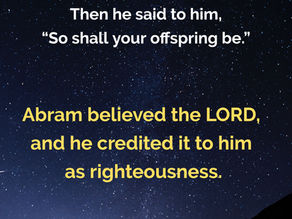Joshua 4:1-7, 18-24 - In Remembrance of Me
- Chad Werkhoven
- Jul 20, 2023
- 3 min read
God knows you remember what you see, so He sets out visible reminders for His people.

Read / Listen
Read Joshua 4:1-7, 18-24
When the whole nation had finished crossing the Jordan, the Lord said to Joshua, 2 “Choose twelve men from among the people, one from each tribe, 3 and tell them to take up twelve stones from the middle of the Jordan, from right where the priests are standing, and carry them over with you and put them down at the place where you stay tonight.”
4 So Joshua called together the twelve men he had appointed from the Israelites, one from each tribe, 5 and said to them, “Go over before the ark of the Lord your God into the middle of the Jordan. Each of you is to take up a stone on his shoulder, according to the number of the tribes of the Israelites, 6 to serve as a sign among you. In the future, when your children ask you, ‘What do these stones mean?’ 7 tell them that the flow of the Jordan was cut off before the ark of the covenant of the Lord. When it crossed the Jordan, the waters of the Jordan were cut off. These stones are to be a memorial to the people of Israel forever.”
--
18 And the priests came up out of the river carrying the ark of the covenant of the Lord. No sooner had they set their feet on the dry ground than the waters of the Jordan returned to their place and ran at flood stage as before.
19 On the tenth day of the first month the people went up from the Jordan and camped at Gilgal on the eastern border of Jericho. 20 And Joshua set up at Gilgal the twelve stones they had taken out of the Jordan. 21 He said to the Israelites, “In the future when your descendants ask their parents, ‘What do these stones mean?’ 22 tell them, ‘Israel crossed the Jordan on dry ground.’ 23 For the Lord your God dried up the Jordan before you until you had crossed over. The Lord your God did to the Jordan what he had done to the Red Sea when he dried it up before us until we had crossed over. 24 He did this so that all the peoples of the earth might know that the hand of the Lord is powerful and so that you might always fear the Lord your God.”
Listen to passage & devotional:
Heidelberg Catechism Q&A 79
Q. Why then does Christ call
the bread his body
and the cup his blood,
or the new covenant in his blood?
(Paul uses the words,
a participation in Christ’s
body and blood.)
A. Christ has good reason for these words.
He wants to teach us that
as bread and wine nourish
our temporal life,
so too his crucified body
and poured-out blood
truly nourish our souls for eternal life.
But more important, he wants to assure us,
by this visible sign and pledge,
that we, through the Holy Spirit’s work,
share in his true body and blood
as surely as our mouths receive
these holy signs in his remembrance,
and that all of his suffering and obedience
are as definitely ours
as if we personally had suffered
and paid for our sins.
Summary
God's people crossing the Jordan river is one of the most important stories in the Bible, representing the culmination of God saving His covenant people and returning them back to the promised land. The previous generation of Israelites had seen God part the Red Sea so they could escape Egypt on dry land, and now their sons and daughters crossed the Jordan River at flood stage on dry ground.
As amazing as those miracles were, God knows how fickle people's memories are. Within days of crossing the Red Sea, Israel was once again doubting God's power to save them, having forgotten what they had seen with their own eyes.
So God orders Joshua to pick up some souvenirs on the way. Twelve men, one representing each tribe, were to carry a large stone from the middle of the Jordan and then set them up where the Israelites spent their first night back at home. God wanted them to have a physical reminder of what He'd done for them.
God not only commanded them to set a monument to remember, but He commands them what and why to remember. This isn't just for you, He instructed them, but it's a tool by which you must instruct your children by reminding them of how God saves His people.
After all, there's always one consistent reason that God does what He does and provides what He provides:
So that all the peoples of the earth might know that the hand of the Lord is powerful and so that you might always fear the Lord your God (v24).
Dig Deeper
Just about every communion table in every Protestant sanctuary has the same words of Jesus carved into it: This Do In Remembrance of Me.
God knows that you need a physical reminder of what He's done for your salvation. He's invited you to His Table for an ongoing, tangible reminder that Christ did something much more powerful than splitting the sea or heaping up a flooding river: that His body was broken, and His blood poured out so that you could have complete remission of all of your sins.
Make sure that you heed the next invitation so that you can be reminded and the next generation can know the hand of the Lord is powerful and always fear the Lord our God.
ACKNOWLEDGE WHO GOD IS: Our Father, who saves His covenant people and meets them in their weakness;
ALIGN YOUR LIFE WITH GOD'S WILL: Thank God for the reminder of His grace communion represents and that you'll eagerly anticipate the next meal;
ASK GOD FOR WHAT YOU NEED:
Read the New Testament in a year, a chapter a day - Luke 17



















Comments